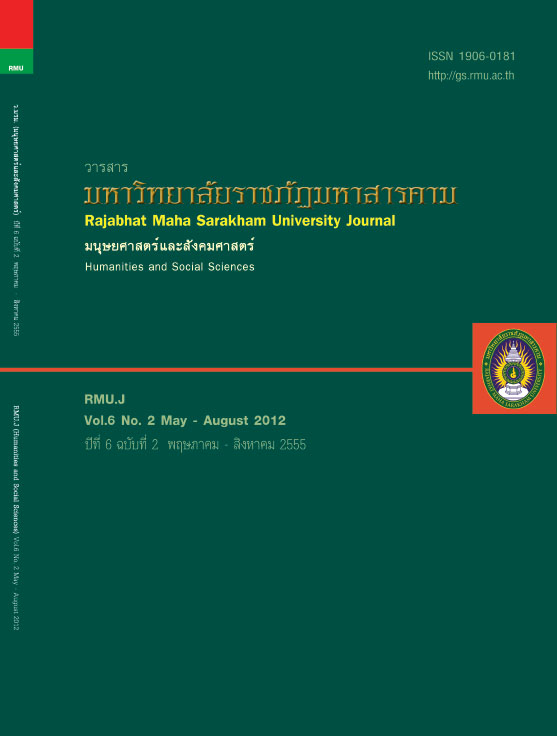ปฏิสัมพันธ์เชิงอำนาจระหว่างรัฐ ทุน และชุมชนในการจัดการป่าชุมชนดงเค็ง อำเภอพนมไพร จังหวัดร้อยเอ็ด; Power Interaction among State, Capital, and Community in Dong Kheng Community Forest Management, Phanom Prai District, Roi-et Province.
Main Article Content
บทคัดย่อ
การวิจัยครั้งนี้ มีวัตถุประสงค์ ประการแรก เพื่อศึกษารูปแบบและลักษณะการปฏิสัมพันธ์เชิงอำนาจในการจัดการป่าชุมชนดงเค็ง
อำเภอพนมไพร จังหวัดร้อยเอ็ด และประการที่สอง เพื่อศึกษาผลลัพธ์ที่ตามมาจากปฏิสัมพันธ์เชิงอำนาจในการจัดการป่าชุมชนดงเค็ง
ใช้รูปแบบวิจัยเชิงคุณภาพ เก็บรวบรวมข้อมูลจากประชากรเป้าหมาย 2 กลุ่ม ได้แก่ กลุ่มผู้ให้ข้อมูลสำคัญ (Key informant)
ได้แก่ คณะกรรมการ และสมาชิกป่าชุมชน จำนวน 30 คน และกลุ่มผู้ให้ข้อมูลที่เป็นผู้รู้ ได้แก่ ผู้อาวุโสในชุมชน กำนัน
ผู้ใหญ่บ้าน นายกองค์การบริหารส่วนตำบล สมาชิกสภาองค์การบริหารส่วนตำบล เจ้าหน้าที่องค์กรพัฒนาเอกชน นักวิชาการ
อดีตแกนนำสมัชชาคนจน จำนวน 15 คน เครื่องมือที่ใช้ในการวิจัย ได้แก่ การจดบันทึกภาคสนาม การจัดเวทีระดมความคิด
เห็น การสัมภาษณ์แบบเจาะลึก ผลการวิจัย พบว่า แต่เดิมป่าชุมชนดงเค็งเป็นพื้นที่ใช้ประโยชน์ร่วมของชุมชน ต่อมารัฐและทุนเข้า
มาใช้ประโยชน์เชิงเศรษฐกิจ คือ ปลูกยูคาลิปตัส จำนวน 2,000 ไร่ โดยไถป่าธรรมชาติทิ้ง ทำให้สูญเสียระบบนิเวศ และกีดกันการ
ใช้ประโยชน์ร่วมของชุมชน จึงกลายเป็นเงื่อนไขของการลุกขึ้นมาเคลื่อนไหวเพื่อเรียกร้องสิทธิในการใช้ประโยชน์ ผ่านปฏิบัติการทาง
สังคมหลายรูปแบบ เช่น การยื่นข้อเรียกร้องผ่านหน่วยงานราชการที่เกี่ยวข้อง การชุมนุมประท้วง การตัดต้นยูคาลิปตัสทิ้ง การร่วม
ชุมนุมกับสมัชชาคนจน ผลจากปฏิสัมพันธ์ด้านหนึ่งกรมป่าไม้ยอมมอบคืนพื้นที่ป่าให้ชุมชนดูแลกันเอง แต่อีกด้านหนึ่งแกนนำได้ถูก
ดำเนินคดีในข้อหาทำลายทรัพย์สินของทางการราชการ ซึ่งผลการวิจัยครั้งนี้ด้านหนึ่งสะท้อนให้เห็นปฏิสัมพันธ์เชิงอำนาจระหว่าง
รัฐ ทุนและชุมชน ภายใต้ความสัมพนธ์เชิงอำนาจที่ไม่เท่าเทียมกัน
The objectives of this qualitative research were to study power interactions between ‘state’, ‘capital’ and
‘community’ in community forest management, and analyze the results of the power interaction. The data
were collected from 2 groups of participants. Group 1 was 30 informants consisting of a community forest
committee and members of community forest. Group 2 was 15 informants consisting of village leaders, chief
executives of sub-district administration, and members of sub-district administration, experts, government
officers and officers of private development. The data were collected by semi-structure interview, deep interview
and participatory observation and no participatory observation.
A research result indicates that, formerly, Dong Keng forest was seen as community’s public interest.
Afterwards, the state and capitalists moved in and set up 2,000 rai of Eucalyptus farming par la practique
deforesting. It caused ecological an¬nihilation and prevented community from a collective benefit. So
communities rose up for their rights and their interest by means of demands to officers, a protest, a cutting
off the Eucalyptus farm, collaboration with Samatcha Konchon - the Assembly of Poor people who were
exploited by Thai state and capitalist. The annihilation resulted in a Division of Forestry vesting Dong Keng
forest to communities, on the other hand, community backbones were arrested in public (bureaucratic)
properties accusation which still prosecution till today. These results illustrate a power interaction between
‘state’, ‘capital’ and ‘community’. A ‘Community’ has an ability to counter ‘state’ and ‘capital’ in the case of
forestry handling. On the other hand, it underlines Thai authoritarianism opposed to the Thai communities
phenomenon, using laws and development policies by intending an economic interest but overlooking a
socio-ecology dimension, bringing about a drastic conflict, as in Dong Keng community forest.
Article Details
1. บทความที่ลงตีพิมพ์ทุกเรื่องได้รับการตรวจทางวิชาการโดยผู้ประเมินอิสระ
2. ข้อคิดเห็นใด ๆ ของบทคามที่ลงตีพิมพ์ในวารสารมหาวิทยาลัยราชภัฏมหาสารคาทม นี้เป็นของผู้เขียน คณะผู้จัดทำวารสารไม่จำเป็นต้องเห็นด้วย
3. กองบรรณาธิการวารสารมหาวิทยาลัยราชภัฏมหาสารคาทม ไม่สงวนสิทธิ์การคัดลอกแต่ให้อ้างอิงแสดงที่มา

